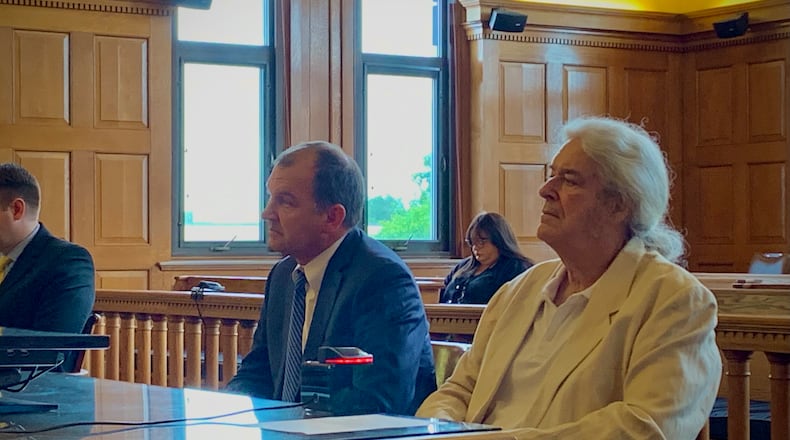“He had a wonderful, long relationship with his wife, and her condition was such that their decisions were what they were in this matter,” Defense attorney Jon Paul Rion said. “But he respects the law, and he respects this court, and thankfully, we were able to get a good resolution with the prosecutor in this matter.”
Macaulay, a retired Wright State University sculpture professor, told officers he had been with his wife. He said he did not participate in the suicide but that they had been planning it, according to the police report.
State law states that assisted suicide is “providing the physical means by which the other person commits or attempts to commit suicide” or; “participating in a physical act by which the other person commits or attempts to commit suicide.”
Several contributed columns and letters to the editor arguing for and against the ethics and legality of assisted suicide have been published in Ideas & Voices since the case was initially reported.
In today’s Ideas & Voices, the debate continues with two opposing perspectives on how end-of-life care should be handled in Ohio.
Want to share your perspective? Submit letters to the editor and contributed columns on this topic to edletter@coxinc.com.
A patient’s plea for empowered choice around end-of-life options
“Can’t I do something to end this?” George asked his doctor. He was dying of metastatic lung cancer that left him continually and severely short of breath. He was enrolled in hospice and received excellent palliative care. With continued oxygen and other supportive medicines to make him as comfortable as possible, he was likely to survive for another few weeks. But the shortness of breath was intolerable to George. His physician called for an ethics consultation.
In my 25 years as a clinical ethicist, end-of-life questions and dilemmas, like this one, were by far the most common reason for a call. I am old enough to remember when the notion of not starting aggressive interventions such as dialysis or mechanical ventilators was troublesome to many people. Withdrawing treatments that had already been started was downright controversial. Since then, we have come a long way, and patients are better informed of their options. However, we have not fully assured end-of-life rights by providing access to Medical Aid in Dying, even though a 2018 survey shows that 7 in 10 Ohio voters support it.
- Read more from Dr. Barbara Daly, a board member of Ohio End of Life Options.
Preserving dignity and true compassion - a Catholic perspective on assisted suicide
While assisted suicide was only recently legalized in select states in the U.S., human dignity transcends time and place. As Pope Francis said, “That every human being possesses an inalienable dignity is a truth that corresponds to human nature apart from all cultural change.” The Catholic understanding of human dignity is that all persons have immeasurable value, regardless of their circumstances or stage in life—including immigrants, those with disabilities, and the terminally ill. I constantly find myself reassuring my father of his inherent worth despite his inability to help with basic tasks, like carrying my bags to the car as he always did at the end of my weekend visits.
Contrary to today’s ‘throwaway culture,’ as Pope Francis describes it, which will end a life to solve a problem, the Catholic Church believes human dignity is irrevocable, even when one suffers deeply. Instead, suffering can transform us and those we love. Not only has my dad grown in his prayer life, but he more openly expresses his love and appreciation. When someone dear to us is hurting, we are moved to compassion (meaning to suffer with) and respond. My siblings, aunts, uncles, cousins, and neighbors have all taken time to be with and help care for both of my parents. Preparing to say goodbye, at least here on earth, brings an acute awareness of the precious gift each individual is to the whole human family.
About the Author



